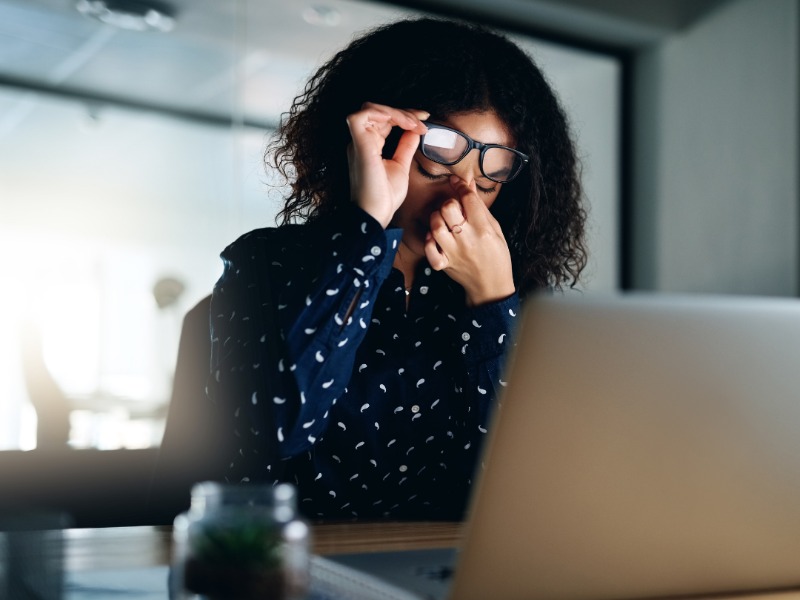Eye Health – Part 1: Computer Vision Syndrome

by Lyne Desforges
Registered Holistic Nutritionist & Culinary Nutrition Expert
Your Eyes in the Digital Age
With more and more people working from home or in virtual schooling, increased screen time seems inevitable. But how is that affecting the health of your eyes? Are your eyes tired at night? Are they burning and red? Are you constantly squinting when looking at your screen?
According to 2019 survey by Alcon Canada, Canadians report spending an average of 11 hours per day looking at screens. Another Alcon survey conducted in 2020 revealed that 80% of Americans are spending more time on their screens as a result of the pandemic. Of that number 50% are reporting their eyes feeling dry as a result of this increased screen time.
General Eye Health
First, make sure that you get checked by an optometrist if you are experiencing any serious issues with your eyes. You may need to update your eyeglass prescription or you may be suffering from another eye-related condition.
Second, if your eyes are itchy and red, it could be related to seasonal allergies. You may want to reduce your intake of histamine-rich foods and include certain botanicals in your diet. Consider trying out our 4-Week Low-Histamine Meal Plan & Guide (available in our online store) to help reduce your symptoms and support you during allergy season.
Computer Vision Syndrome
There are many direct and indirect consequences of spending too much time looking at screens. The term Computer Vision Syndrome is now used to encompass some of these symptoms, especially dry eyes and eye strain.
-
Dry eyes
Looking at screens can decrease the blinking rate by 66% (the normal average is 18 blinks per minute), and many blinks are incomplete. Since blinking is essential to keep the cornea lubricated, and to remove any debris, it is no wonder that so many people experience dry eyes.
-
Eye strain and blurred vision
Looking at digital screens make the eyes work harder. It could be related to the bright lights from the screen or the fact that letters on a screen are not as defined as on the printed page. This means that there are more demands on the eyes to focus and move across the screen. If your prescription is not made for computer distance viewing, that also puts additional strain on your eye.
-
Headaches/Migraines:
You may start these as a result of eye strain and constantly having to focus. This 2016 research found that high levels of screen time exposure are associated with migraines in young adults, however, no significant association was found with non-migraine headaches.
-
Neck, Shoulder, Hip and Back pain
A research paper from Finland looked at young adults (30 years and younger) and the use of computers and mobile devices. The study reported that 53% of young adults had reported pain, numbness or aches in the neck and 32% had aches in hips and lower back. Women experienced more pain than men. Add to the fact that spending all that time sitting is not helping.
-
Weight Gain
There are many studies supporting the fact that more screen time exposure can lead to obesity, especially in children and teenagers. The pandemic may have exacerbated this as virtual learning has replaced in class options.
-
Disrupted Sleep Pattern
Computer screens and digital devices emit blue light, which can impede the production of melatonin, your sleep hormone. A review of studies looked at the link between youth screen media use and sleep. 90% of the studies found an association between screen media use and delayed bedtime and/or decreased total sleep time. That’s why we strongly suggest turning off all your screens at least one hour before bedtime.
Adjust Your Surrounding
As the American Optometric Association points out, these symptoms may result from one or a combination of these factors: poor lighting, glare on a digital screen, improper viewing distances, poor seating postures, and uncorrected vision problems.
It is practically impossible in this day and age to eliminate all screen time. However, there are a few tips we can provide to help you manage it better so that the effects on your eyes and your overall health may be mitigated. However there is a lot you can do in terms of diet and lifestyle. Check out our other two blogs Eye Health -Part 2, Top 5 Nutrients for Healthy Eyes, and Eye Health – Part 3, Top 10 Lifestyle Tips for Health Eyes for more in-depth information.

Educating, motivating and inspiring have always been important aspects of my professional journey. Through workshops, cooking classes, customized menus & recipe books, and online programs, I guide clients towards healthier food choices and eating habits.
